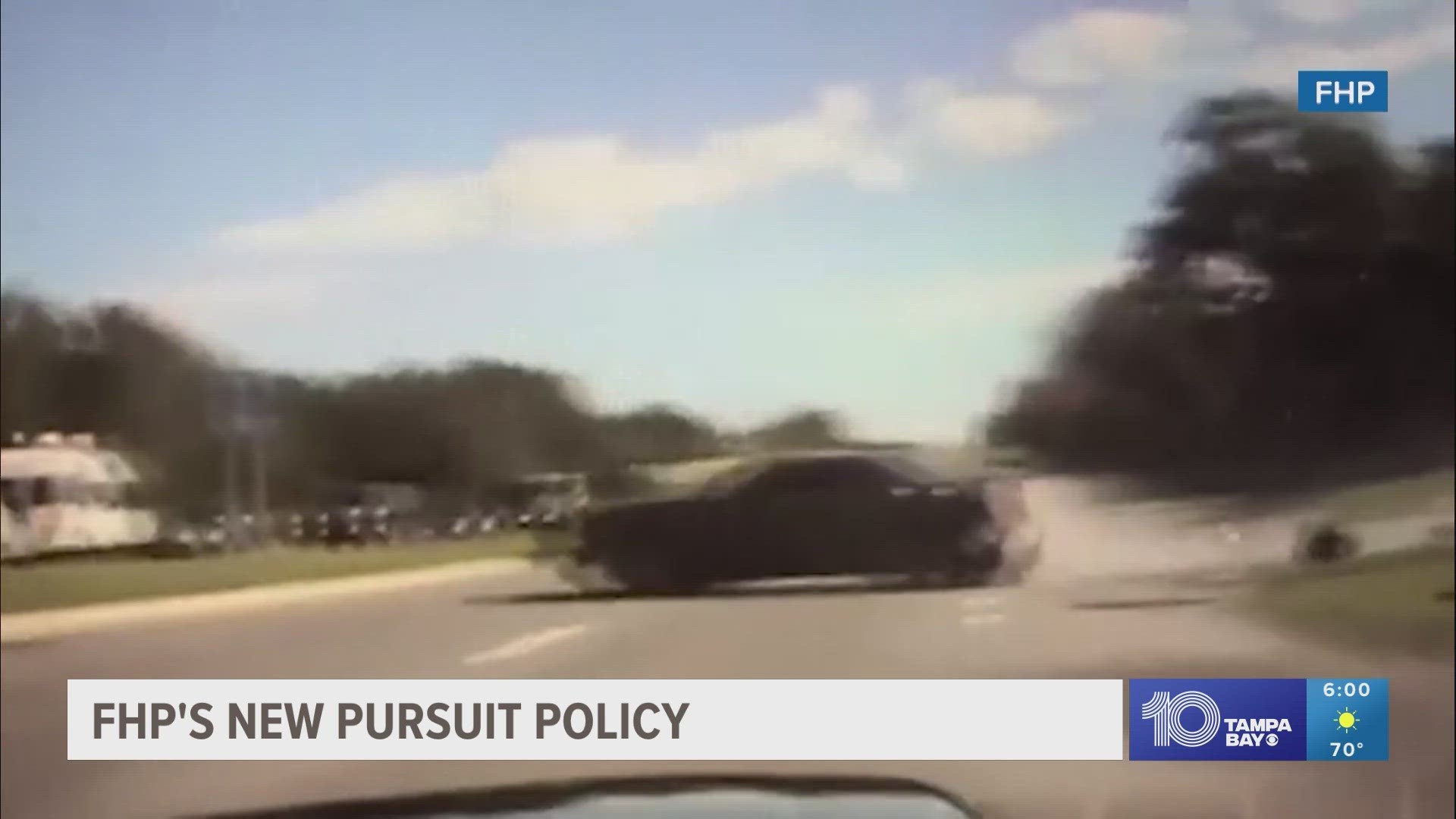TAMPA, Fla. — You may have noticed a series of police pursuits in the Tampa Bay region recently.
It comes on the heels of a policy change at the Florida Highway Patrol. The agency’s updated chase policy gives troopers more flexibility when it comes to deciding whether to engage in a chase.
However, some critics are concerned it could lead to more unintended injuries and even fatalities among innocent bystanders and the officers themselves.
Among those concerned is retired police Capt. Tom Gleason.
“They made a decision that we're going to allow more pursuits,” Gleason said
Gleason says he’s no softy when it comes to catching bad guys. He spent 35 years in law enforcement. Decades of that time were spent as a police pursuit instructor, teaching others how to deploy stop sticks and conduct Precision Immobilization Techniques or “PIT” maneuvers.
He and other critics take issue with the Florida Highway Patrol's newest pursuit policy.
“I think that there is a great possibility that you will see additional damages to vehicles, you'll see additional injuries that come out of it,” Gleason said. “And my take is, is the risk worth the outcome?”
FHP's new chase policy quietly took effect near the beginning of the year.
While its previous guidelines prohibited all other pursuits outside of felonies, reckless driving, and DUIs, the new rules give troopers more leeway to decide for themselves when to initiate a chase.
It also allows FHP motorcycles to engage in pursuits and lets troopers drive on the wrong side of the road during a chase.
“And with that comes liability, and bigger than liability to me is the number of innocents, bystanders - who are affected through that pursuit,” Gleason explained.
For the past decade, Gleason has been working with an organization called Pursuit Safety.
His perspective on police chases was changed dramatically in the year 2000 by personal tragedy when his own son, Brian, who was also in law enforcement, was killed during a high-speed pursuit.
“He was a passenger, and the patrol car rolled at 80-something miles an hour,” he explained. “And my son burned up in the patrol car.”
We reached out to the Florida Highway Patrol, but they declined our repeated requests for an interview.
The agency did, however, send us a written statement saying that along with the policy change, FHP is investing over $20 million in enhanced vehicle operations training facilities and nearly $7 million in new aviation assets designed to intercept fleeing felons.
But Gleason says just because FHP troopers have more training doesn't mean the person they’re chasing does.
“He hasn't had any training at all,” Gleason said. “And the faster that you are chasing him, the faster he is going, the more risks that are incurred to the general public.”
FHP's statement also says, “Under Gov. DeSantis, Florida law-enforcement leads as a law and order state holding dangerous criminals accountable,” and that they, "Put focus and emphasis on the destructive behaviors of reckless fleeing felons, instead of excusing, or ignoring their behaviors and decisions."
But relatives of innocent people injured and killed during police pursuits increasingly ask: At what cost?
This past September, a national think tank on policing standards concluded that police chases should be rare. The Police Executive Research Forum report found the danger to suspects, officers and innocent bystanders often outweighs the immediate need to take someone into custody.
The study also showed the number of fatal crashes involving a police pursuit peaked in the year 2020 at 455.
In May 2022, the Tampa Police Department changed its pursuit policy when it came to auto burglary suspects.
It came after an innocent Plant City woman was killed in a crash where TPD had been chasing the driver of a stolen pickup truck.
Gleason praised the policy change as progressive. Especially, he says, in an age where high-tech cameras give law enforcement more options to find and arrest suspects at a later date.
“Sometimes the better part of valor is to know when to say when," he said.
While most law enforcement agencies in the Tampa Bay area have fairly standardized policies when it comes to police pursuits, they vary slightly depending on the size of the department and the population density in the area.
As Florida grows and technology changes, many have updated those policies, balancing the risk.
That’s why some believe FHP's newest pursuit policy is a step backward.
“I would encourage FHP, when they do their in-service training, to have a couple of victims that are innocent come in and speak to their class,” Gleason said. “Because it really will give you a different perspective.”

